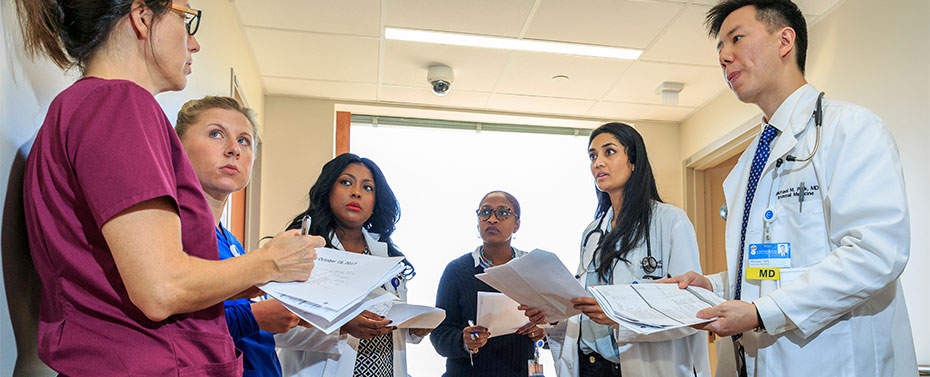Hospital Medicine

All core inpatient rotations are completed at Englewood Hospital. These inpatient rotations are designed to successfully prepare residents for postgraduate experiences, caring for a broad variety of patients with diagnoses ranging from “bread and butter” cases to those with more complex conditions. Our Hospitalist service, including all teaching teams, have transitioned to a “Geographic Localization” model where each resident team is localized to a single hospital unit with the majority of their patients on that floor. This model has led to improved efficiency and better communication between our residents and members of the healthcare team with plans underway to begin structured interdisciplinary rounds. The structure of each rotation is designed to provide residents with increasing supervisory and teaching responsibility as they gain clinical experience and develop and hone different skills each year. During these rotations, the residents are exposed to patients with diverse cultural and socioeconomic backgrounds and pathologies. Our residents experience multidisciplinary collaboration as they care for their patients. It is also here that residents learn the tenets of managing patients participating in our Bloodless Medicine program. All of our core inpatient rotations utilize a Night Float system to provide cross-coverage.
Team A/B/Rh
The Team A/B/Rh rotation forms the backbone of our inpatient rotations. Each team comprises one PGY2 senior and two interns under the supervision of a Hospitalist with a patient cap of 20 with the goal to maintain census closer to 16 to ensure and prioritize adequate time for discussion and teaching. The Hospitalist leads formal teaching rounds daily, often at the bedside, and offers real-time support in patient care, teaching and discharge planning. Each hospital floor is designed to take care of a specific subset of patients, affording residents exposure to a wide variety of clinical cases and pathology as they rotate through these three teaching teams.
Team O
The Team O rotation is designed as a manager service and mirrors a traditional 7-on, 7-off Hospitalist schedule. The team consist of one PGY3 who works directly under the supervision of a Hospitalist. The PGY3’s role is that of a junior attending. Each team works seven 12-hours shifts and has the following 7 days off. During their inpatient weeks, residents admit and manage patients as well as provide medical consultation. In addition, the Team O resident acts as the primary responder for the Emergency Code team during evening hours. The Emergency Code team responds to all rapid responses, stroke codes and code blues for the hospital.
During their days off (ADMIN shifts), residents participate in our Patient Safety curriculum where they learn about the importance of recognizing, preventing and responding to medical errors and participate in root-cause analyses. Additionally, residents complete Perioperative Medicine and Medical Consultation e-learning modules through the Society of Hospital Medicine and gain skills in Coding and Billing through the American College of Physicians online learning.
Medical Admitting Resident (MAR)
The Medical Admitting Resident or “MAR” rotation is a 4-week rotation designed to give PGY3 residents an opportunity to hone their clinical skills around triaging and admitting patients, handoffs, medical consultation, emergency response, and evaluation of patients to determine need for transfer to higher level of care. Under the supervision of the triaging Hospitalist, the MAR reviews and triages patients requiring admission to the teaching service and signs out patients to the respective teaching teams. The MAR resident also acts as the primary responder for the Emergency Code team during daytime hours.
Night Float
The Night Float team provides cross-coverage and admits all new patients and transfers for all inpatient services. All night float residents work Sunday-Friday, with 2 days off per week. The PGY1 residents provide cross-coverage for all inpatient teams while the PGY2 and PGY3 residents do all admissions for Teams A/B/Rh/O PGY1 and PGY3 residents act as the primary responders for the Emergency Code team overnight. All Night Float residents are supervised by a Nocturnist and assisted by a Nurse Practitioner during emergency codes.
